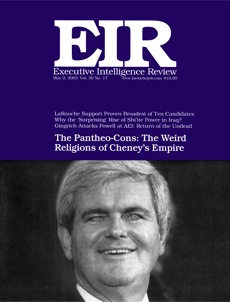The Weird Religions of Cheney’s Empire: The Pantheo-cons
by Lyndon H. LaRouche, Jr.
The forces committed to reversing the principles of the Treaty of Westphalia, which rescued Europe from a 1511-1648 period of religious wars, are relying largely upon developing and deploying a U.S.A.-based pantheistic religious-political movement, in fact a fascist movement, already comparable to, and, potentially, a worse, nuclear menace for humanity as a whole, than the Nazi regime.
The Strauss Kindergarten: Israeli Outcroppings of ‘Universal Fascism’
by Steven Meyer
Gingrich at AEI: The Return of the Undead
by Jeffrey Steinberg
The former Speaker of the House’s diatribe against Secretary of State Colin Powell was a carefully calculated move on the part of the neo-conservative cabal within the Bush Administration, including Vice President Cheney and Defense Secretary Rumsfeld. But their plan to replace Powell with Gingrich is already backfiring, as President Bush reportedly viewed the Gingrich speech as an attack on himself. “This is the most stupid, but understandable mistake that the friends of Newt Gingrich ever made,” commented Lyndon LaRouche.
Economics
California Re-Regulation: Sign of Sanity Amid the Collapse?
by Harley Schlanger
The legislation announced on April 8 by State Sen. Joe Dunn and a number of Democratic Party leaders in the State Assembly would end the state’s disastrous deregulation “experiment” which has been the target of a nationwide mobilization by Lyndon LaRouche’s Presidential campaign, against the insanity of deregulation, since August 2000.
Feds Still Nuts Over Dereg
by Marsha Freeman
SE Asia Service Economy Blown Apart by SARS
by Martin Chew Wooi Keat
Talks Held in Mexico on LaRouche’s ‘Great American Desert’ Development
by Marcia Merry Baker
International
Why the ‘Surprising’ Rise of Shi’ite Power in Iraq?
by Hussein Askary
Contrary to the views of some Western analysts, the Shi’ite emergence as a political force is not a harbinger of sectarian strife, which has been unknown in Iraq’s modern history. But if the United States and Britain pursue policies that foster the continued deterioration of the Iraqi people’s living standards, and political instability in the country, a disastrous plunge into sectarian warfare could occur in the short term.
Oil Robbery Under Way in Occupied Iraq?
by Muriel Mirak-Weissbach
Brazilians Denounce Iraq Occupation as Threat to Sovereignty of Nations
by Lorenzo Carrasco
Iraq War ‘Aimed Against the Eurasian Land-Bridge’ From a speech by Congressman Irapuan Teixeira.
Philippines Becoming Just U.S. War Appendage?
by Michael Billington and Gail G. Billington
An interview with Father Eliseo Mercado.
No. Ireland Report: Chance to Clean House
by Mary Jane Freeman and Mark Burdman
National
FEC Report: Presidential Candidate LaRouche Has Broadest Support
The April 15 filings of the Democratic Presidential candidates with the Federal Election Commission, show that the exclusion of Lyndon LaRouche from candidate forums and debates is a blatant political fix, which ignores the most objective criteria of candidate support available—the amount of money raised, and the base of contributors.
LaRouche Youth Open Campus 2004 Campaign
by Paul Gallagher
Lyndon LaRouche held the inaugural national campus webcast of his Presidential campaign on April 24, speaking with journalists from about 20 campuses, and many others around the country.
Justice Department Evasions on ‘Patriot II’
by Edward Spannaus
Budget Gap Grows as GOP Splits
by Carl Osgood
Chicken-Hawks Now Prepare War on Syria
by William Jones
From a forum at the Hudson Institute.
Israel’s Attack on the ‘USS Liberty’
by Jeffrey Steinberg and Michele Steinberg
An interview with Tito Howard.
‘The DLC Are Democrats Who Are Really
by Nina Ogden
Reactionary Republicans’ An interview with Sen. Eugene McCarthy.
Book Reviews
Heidegger: The Roots of War and Fascism Today
by Mark Burdman
Heidegger’s Children: Hannah Arendt, Karl Löwith, Hans Jonas, and Herbert Marcuse, by Richard Wolin.
Interviews
Fr. Eliseo Mercado
Father Mercado was president of Notre Dame University in the Philippines; chairman of the Independent Cease-Fire Monitoring Committee of the Philippine Government and the Moro Islamic Liberation Front; and now chairs the National Peace Council in Mindanao. He is a Doctor of Divinity and Humanity.
Tito Howard
The producer of the documentary film “The Loss of Liberty” was interviewed on “The LaRouche Show.”
Eugene McCarthy
The former U.S. Senator discusses his 1967-68 Presidential campaign, which showed how those disenfranchised by corrupt party leaderships can mobilize effectively around truthful ideas.
Departments
Report From Germany
by Rainer Apel
Schröder Shoots Himself in the Foot.
Editorial
The Empire Strikes Out.



